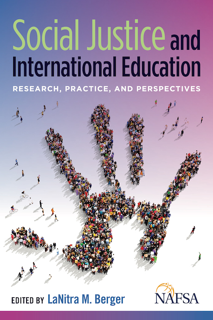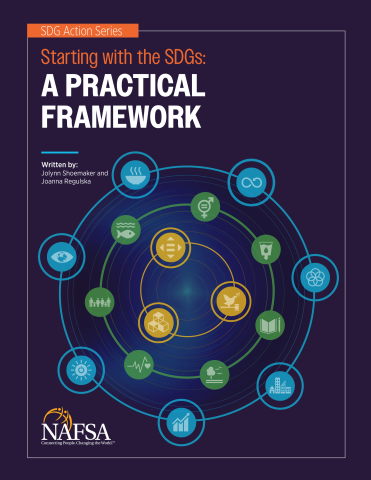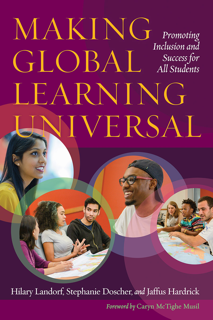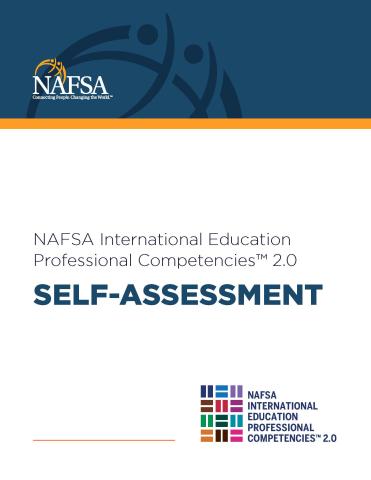Social Justice and International Education
In Social Justice and International Education: Research, Practice, and Perspectives, educators, scholars, and practitioners from across the field explore social justice research and social justice in practice, as well as provide a variety of perspectives on this important and timely topic.
The book brings together educators, scholars, and practitioners doing innovative work promoting social justice, confronting inequality, and fostering social responsibility in a global context. The book does not operate on a singular definition of social justice; rather, the authors describe their own definition and how it has guided their work. The book explores research, social justice in practice, and different perspectives from practitioners across the field.
About the editor: LaNitra M. Berger, PhD, is the senior director of the Office of Fellowships in the Office of Undergraduate Education at George Mason University. Her work focuses on preparing and supporting students, particularly those from disadvantaged backgrounds, in applying for nationally competitive awards such as Fulbright, Truman, Boren, and the Critical Language Scholarship. Berger serves on the NAFSA Board of Directors as the vice president for public policy and practice. She received a PhD in art history from Duke University and a BA in art and international relations from Stanford University.
Table of Contents:
Part I: Social Justice Research
Chapter 1: International Education's Potential for Advancing Social Justice (David Wick and Tasha Willis)
Chapter 2: Equity Education in a Time of Rising Nationalism: Challenges and Complexities (Supriya Baily)
Chapter 3: The Evolution of Social Justice in International Higher Education (Aaron Clevenger)
Chapter 4: Being "Black" in a U.S. Content: Racialized Experiences of African and Caribbean International Students (Shontay Delalue)
Chapter 5: "Rebeldes en Acción": A Case Study in English Teaching in a Marginalized Colombian High School (Yecid Ortega)
Part II: Social Justice in Practice
Chapter 6: View, Voice, and Visibility: A Liberating Framework for Social Justice in Education Abroad (Eduardo Contreras Jr.)
Chapter 7: Social Justice-Centered Education Abroad Programming: Navigating Social Identities and Fostering Conversations (Malaika Marable Serrano)
Chapter 8: Social Justice and Study Abroad at Historically Black Colleges and Universities: A Case Study of Howard University (Tonija Hope Navas)
Chapter 9: Supporting Deaf Students in Education Abroad (Becca Aburakia-Einhorn)
Chapter 10: Integrating Refugees into U.S. Higher Education (Bryce Loo)
Chapter 11: Exploring the Intersection of Transnationalism and Critical Race Theory: A Critical Race Analysis of International Students' Experiences in the United States (Christina W. Yao, Chrystal A. George Mwangi, Victoria K. Malaney Brown)
Part III: Perspectives from the Field
Building a Movement for Justice: Short-Term Programs Abroad (Shoshanna Sumka)
Study Abroad: The Power of Finding Your Place in the World (Sally Schwartz)
Toward Family Diplomacy for a More Caring World (Paul LaChelier)
Embracing Our Greater Purpose: The Role of International Education in Advancing Educational Equity (Andrew J. Gordon)
Afrophobia and International Education (Keshia Abraham)
Street Law: Using the Law to Effect Social Justice (Seán Arthurs and John Lunney)
Perspectives on the Intersections of Social Justice and International Education (Jessica Black Sandberg)
Social Justice Through the Eyes of an International Educator (Rodolfo "Rudie" Altamirano)
Social Justice and International Education: Where Are the Voices of International Students and Scholars? (Ling G. LeBeau)
The Sustainable Development Goals, Social Justice, and Global Learning (Joe Warren)
The Fight for Refugee Children's Education (Zama Neff)
over&over (Pádraig Ó Tuama)

Social Justice and International Education
In Social Justice and International Education: Research, Practice, and Perspectives, educators, scholars, and practitioners from across the field explore social justice research and social justice in practice, as well as provide a variety of perspectives on this important and timely topic.
The book brings together educators, scholars, and practitioners doing innovative work promoting social justice, confronting inequality, and fostering social responsibility in a global context. The book does not operate on a singular definition of social justice; rather, the authors describe their own definition and how it has guided their work. The book explores research, social justice in practice, and different perspectives from practitioners across the field.
About the editor: LaNitra M. Berger, PhD, is the senior director of the Office of Fellowships in the Office of Undergraduate Education at George Mason University. Her work focuses on preparing and supporting students, particularly those from disadvantaged backgrounds, in applying for nationally competitive awards such as Fulbright, Truman, Boren, and the Critical Language Scholarship. Berger serves on the NAFSA Board of Directors as the vice president for public policy and practice. She received a PhD in art history from Duke University and a BA in art and international relations from Stanford University.
Table of Contents:
Part I: Social Justice Research
Chapter 1: International Education's Potential for Advancing Social Justice (David Wick and Tasha Willis)
Chapter 2: Equity Education in a Time of Rising Nationalism: Challenges and Complexities (Supriya Baily)
Chapter 3: The Evolution of Social Justice in International Higher Education (Aaron Clevenger)
Chapter 4: Being "Black" in a U.S. Content: Racialized Experiences of African and Caribbean International Students (Shontay Delalue)
Chapter 5: "Rebeldes en Acción": A Case Study in English Teaching in a Marginalized Colombian High School (Yecid Ortega)
Part II: Social Justice in Practice
Chapter 6: View, Voice, and Visibility: A Liberating Framework for Social Justice in Education Abroad (Eduardo Contreras Jr.)
Chapter 7: Social Justice-Centered Education Abroad Programming: Navigating Social Identities and Fostering Conversations (Malaika Marable Serrano)
Chapter 8: Social Justice and Study Abroad at Historically Black Colleges and Universities: A Case Study of Howard University (Tonija Hope Navas)
Chapter 9: Supporting Deaf Students in Education Abroad (Becca Aburakia-Einhorn)
Chapter 10: Integrating Refugees into U.S. Higher Education (Bryce Loo)
Chapter 11: Exploring the Intersection of Transnationalism and Critical Race Theory: A Critical Race Analysis of International Students' Experiences in the United States (Christina W. Yao, Chrystal A. George Mwangi, Victoria K. Malaney Brown)
Part III: Perspectives from the Field
Building a Movement for Justice: Short-Term Programs Abroad (Shoshanna Sumka)
Study Abroad: The Power of Finding Your Place in the World (Sally Schwartz)
Toward Family Diplomacy for a More Caring World (Paul LaChelier)
Embracing Our Greater Purpose: The Role of International Education in Advancing Educational Equity (Andrew J. Gordon)
Afrophobia and International Education (Keshia Abraham)
Street Law: Using the Law to Effect Social Justice (Seán Arthurs and John Lunney)
Perspectives on the Intersections of Social Justice and International Education (Jessica Black Sandberg)
Social Justice Through the Eyes of an International Educator (Rodolfo "Rudie" Altamirano)
Social Justice and International Education: Where Are the Voices of International Students and Scholars? (Ling G. LeBeau)
The Sustainable Development Goals, Social Justice, and Global Learning (Joe Warren)
The Fight for Refugee Children's Education (Zama Neff)
over&over (Pádraig Ó Tuama)
Reviews
“This is the right book at the right time. Published against the backdrop of a pandemic and protests for racial justice, it presents a compelling mixture of research, practice, and personal narratives that illuminate the power of a social justice framework within global education. Kudos to Berger and her colleagues for their excellent work and the innovative ideas that will drive change in international education for years to come.”—Heather Barclay Hamir, PhD, president and CEO, Institute for Study Abroad (IFSA)
“This important volume provides international educators with articles from researchers and practitioners focused on an issue at the center of international learning and understanding: social justice. Articles support critical thinking and ideas for action in response to local, national, regional, and international inequities at a time when societies are responding to systematic racial injustice and the uneven impacts of COVID-19, which have highlighted inequality gaps within and among nations.”—Gary Rhodes, PhD, professor and director, Center for Global Education, California State University, Dominguez Hills
“This book provides an incredible compilation of theoretical perspectives, case studies, and personal narratives centered on an issue that rarely receives the in-depth analysis it deserves. Educators and practitioners working in every domain of international education and exchange will find practical applications and strategies they can integrate into their regular practice, whether it is supporting international students as they navigate the complex racial climate of the United States or embedding pedagogical strategies into study abroad programs that cultivate social justice-oriented students. This book should be required reading for early career and established educators and practitioners.” —Lily López-McGee, PhD, director, Thomas R. Pickering Foreign Affairs Program, Howard University
“I cannot think of a more apt time for such a volume. The authors do much to demystify social justice, which can feel altruistic and unattainable, by outlining concrete and meaningful ways by which international educators can rethink and retool their daily practices. Doing so involves understanding the inequalities and power dynamics that exist at home and abroad, tied to broader historical, economic, political, and social forces. Understanding and mitigating these realities allows us to serve the needs of our students, faculty, staff, and community partners better within the context of international education.”—Nick Gozik, PhD, director, Office of International Programs and McGillycuddy-Logue Center for Undergraduate Global Studies, Boston College
“This volume is a must-read for any traveler, thinker, and activist. In this vital addition to the literature linking global education and social justice, Berger has compiled valuable perspectives to help situate intercultural exchanges not as 'places of encounter’ but as critical areas for 'negotiation and discussion’—a perspective that certainly tracks with my experiences of living and traveling around the world as a means of informing and reinforcing my own social justice framework and action.”—Latanya Mapp Frett, JD, returned Peace Corps volunteer and global human rights champion




